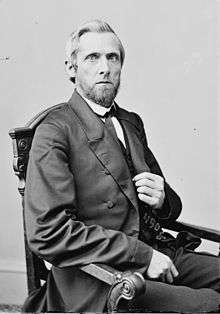Waitman T. Willey
| Waitman T. Willey | |
|---|---|
 | |
| United States Senator from Virginia | |
|
In office July 9, 1861 – March 4, 1863 | |
| Preceded by | James M. Mason |
| Succeeded by | Lemuel J. Bowden |
| United States Senator from West Virginia | |
|
In office August 4, 1863 – March 4, 1871 | |
| Preceded by | (none) |
| Succeeded by | Henry G. Davis |
| Personal details | |
| Born |
October 18, 1811 Marion County, Virginia (now West Virginia) |
| Died |
May 2, 1900 (aged 88) Morgantown, West Virginia |
| Political party |
Unionist, Republican |
Waitman Thomas Willey (October 18, 1811 – May 2, 1900) was an American lawyer and politician from Morgantown, West Virginia. He represented both the states of Virginia and West Virginia in the United States Senate and was one of West Virginia's first two Senators. He played a fundamental role in the formation of the state of West Virginia during the Civil War.
Biography
Willey was born in 1811, in a log cabin near the present day Farmington, West Virginia. He graduated from Madison College (later Allegheny College) at Uniontown, Pennsylvania, and settled at Morgantown in 1833. He built the Waitman T. Willey House in 1839-1840; it was listed on the National Register of Historic Places in 1982.[1] From 1841 to 1852 he served as Clerk of the County Court of Monongalia County and in 1852 was the Whig candidate for Congress. He was active in local political life, serving in a variety of positions, and was a popular speaker for the literacy society and the temperance campaign.[2] At the Virginia Constitutional Convention of 1850-51, he argued in favor of universal suffrage for white men as he believed that eastern Virginian elites dominated political power in the state.[2] He was a member of the Virginia Secession Convention in 1861. He became an activist at the First Wheeling Convention for West Virginia statehood. The "Restored Government of Virginia" elected him to the U.S. Senate to fill the vacancy of Senator James M. Mason. He was later elected to serve as one of the first two U. S. Senators from West Virginia (1863–1871). On May 29, 1862, Willey presented the petition to Congress for the creation of West Virginia.[3]
References
- ↑ National Park Service (2010-07-09). "National Register Information System". National Register of Historic Places. National Park Service.
- 1 2 Fredette, Allison (June 20, 2014). "Waitman T. Willey (1811–1900)". Encyclopedia Virginia.
- ↑ unknown (n.d.). "National Register of Historic Places Inventory Nomination Form: Waitman T. Willey House" (PDF). State of West Virginia, West Virginia Division of Culture and History, Historic Preservation. Retrieved August 18, 2011.
External links
- Waitman T. Willey in Encyclopedia Virginia
- biographic sketch at U.S. Congress website
- The West Virginia & Regional History Center at WVU has two collections of Waitman T. Willey's papers, A&M 3 and A&M 1361
| United States Senate | ||
|---|---|---|
| Preceded by James M. Mason |
U.S. Senator (Class 1) from Virginia July 9, 1861 – March 4, 1863 Served alongside: John S. Carlile |
Succeeded by Lemuel J. Bowden |
| Preceded by None |
U.S. Senator (Class 2) from West Virginia August 4, 1863 – March 4, 1871 Served alongside: Peter G. Van Winkle and Arthur I. Boreman |
Succeeded by Henry G. Davis |
